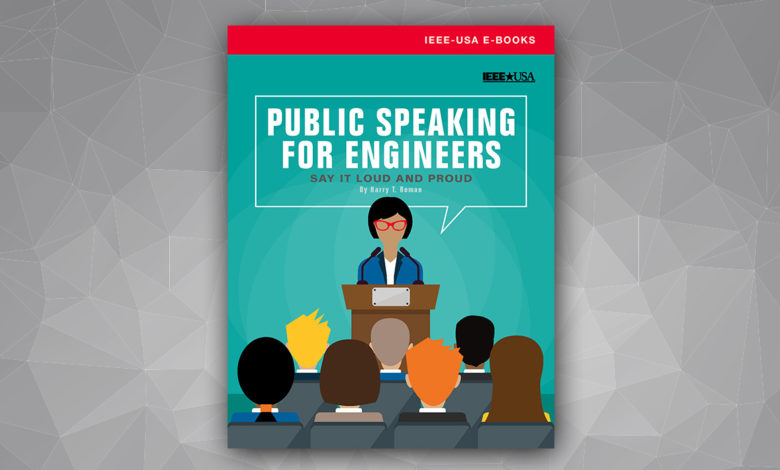
Harry T. Roman wants to share some advice for achieving a successful engineering career. He believes that the so-called “soft” skill of public speaking is far more important in developing a long, fruitful career than technical expertise, mathematical prowess, or analytical knowledge.
“I’ve seen more engineers have their careers cut short because they couldn’t make a cogent presentation, or speak well in public, rather than fail due to technical incompetency,” says this veteran engineer and engineering educator. “Public speaking is a leadership skill, a rallying point,” he explains.
“Those who speak well are respected, listened to, and often emulated,” Roman says. His new e-book, Public Speaking for Engineers–Say It Loud and Proud, offers dozens of ideas that will help almost anyone become an expert, sought-after speaker.
“It’s worth the time and effort to learn to speak well in public,” Roman encourages. For one thing, he points out that lower-level employees may have as little as five to ten minutes at a time to interact directly with senior management. “Senior leaders of your company,” he says, “will form a strong opinion of you by how well you articulate a problem or position, or champion a new idea. You need to make that interaction count.”
Like almost anything else, the author believes that solid preparation is critical to speaking successfully. He urges any would-be speaker to completely understand the subject, and to get the latest details and facts.
In addition, he points out that the audience is just as important as the subject. “Find out who will be listening to you,” he writes. “Will there be noteworthy people in the audience, and do they know the subject as well as you? This knowledge determines your presentation’s approach and sophistication level.” He adds that it’s also helpful to know the age ranges within the audience, as well as what life experiences they have had, if possible. “Target your words to the audience,” he says.
The author strongly believes in the importance of practice before giving a talk. “There is no other way to learn this,” Roman says. “Find an audience of colleagues, family or friends, and listen carefully to what your makeshift audience has to say, making changes where necessary. Then, do it again and again until you’re comfortable.”
He adds, “Some folks like to practice in front of a mirror, and some practice in a quiet room. Always practice before you give any talk, speaking clearly, with a strong voice, and enunciating all words.”
This information-packed e-book is filled with ideas on how to make speeches and presentations both interesting and memorable. For example, throughout the volume, the author repeats what he considers the three key elements of any talk: Tell the audience what you’re going to speak about; tell them the things you came to say; and summarize by telling them what you just told them.
Roman also provides a persuasive list of almost two dozen examples, where his ability to speak before an audience paid off for him during his long career. These range from delivering progress reports on large and complex research projects to representing his company on national professional committees and working groups.
An IEEE Life Senior Member, Roman holds 12 United States patents and has published more than 550 scientific papers, articles, monographs and books. His many honors and recognitions from IEEE and other organizations for his contributions to technology education include the 2015 Region 1 Excellence in Teaching Award. He also has published more than 70 resource books, science kits and other educational products.
Now retired after a 36-year career with PSE&G, New Jersey’s largest utility, he continues to spend many hours in the classroom working with teachers and students and conducting special student project team challenges. He also teaches a course at Montclair State University about applying STEM techniques in the classroom.
Helen Horwitz is an award-winning freelance writer who lives in Albuquerque, N.M. She was with IEEE from 1991 through 2011, the first nine as Staff Director, IEEE Corporate Communications.






